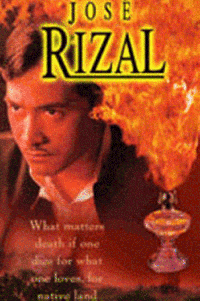José Rizal (film)
| José Rizal | |
|---|---|
 |
|
| Directed by | Marilou Diaz-Abaya |
| Produced by | Gilberto Duavit Felipe Gozon Menardo Jimenez |
| Written by |
Ricky Lee Jun Lana Peter Ong Lim |
| Starring |
Cesar Montano Joel Torre Jaime Fabregas Gloria Diaz Gardo Versoza Pen Medina Mickey Ferriols |
| Music by | Nonong Buencamino |
| Cinematography | Rody Lacap |
| Edited by | Jess Navarro Manet Dayrit |
| Distributed by | GMA Films |
|
Release date
|
June 12, 1998 (as part of the Philippine Centennial celebrations) December 25, 1998 (theatrical release) |
|
Running time
|
175 minutes |
| Country | Philippines |
| Language |
|
| Budget | ₱80 million (estimated) |
| Box office | ₱125 million |
José Rizal is a 1998 Filipino biographical film of the Filipino national hero José Rizal directed by Marilou Diaz-Abaya and starring Cesar Montano as José Rizal.
At the time of its release, it was the most expensive film in the history of Filipino cinema with a budget of over ₱ 80 million. The film was an official entry to the 1998 Metro Manila Film Festival. Upon release, the film met universal critical acclaim.
José Rizal is imprisoned in Fort Santiago under the abusive Spanish colonization. Meanwhile, in Balintawak, Andrés Bonifacio and his fellow secret organization, the Katipunan, commences the uprising against the tyranny created by the Spaniards by tearing their cedulas as a sign of Spanish slavery.
Soon, a first lieutenant of the Artillery, Luis Taviel de Andrade, visits Rizal. Taviel de Andrade did not waste time to study carefully Rizal's case. In just a short period of time, Rizal and Taviel captured each other's sympathy and eventually became friends as they had usual meetings in Rizal's cell in Fort Santiago. Taviel was even able to celebrate Christmas with Rizal in the cell where they drank pan get and sang together.
After Christmas, Rizal was sent to the Royal Audiencia, the colonial court of appeal, to hear the trial against him. Soon after, the magistrates decided to condemn him under firing squad on the 30th of the morning in Luneta.
At the night before the execution, Rizal hallucinates, seeing his alter ego—protagonist, Crisostomo "Simoun" Ibarra, from his second book, El Filibusterismo, tempting him to change the climax of the novel.
...
Wikipedia
